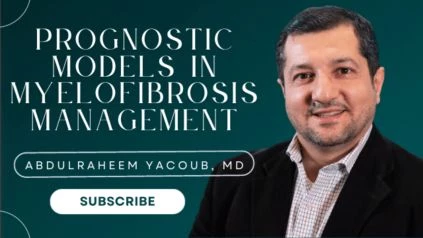Date: October 25, 2023
In a prestigious medical conference hall filled with experts in the field of hematological cancers, Abdulraheem Yacoub MD took the stage to address the attentive audience. He commenced his speech with gratitude, saying, “Thank you, Lucia. It’s my pleasure now to invite Abia Kube, who runs what I call an MPN Empire in the middle of the country, and is leading the Limber phase three study in the front line and has also done some great work with the consortium. Thanks, Abe. Good afternoon.”
Dr. Yacoub’s appreciation extended further as he continued, acknowledging the con invitation extended by Britney and Rami. He remarked, “Thank you, Britney, and Rami for the con invitation. And this is an absolutely elegant event we look forward to every year.”
Transitioning into the heart of his presentation, Dr. Yacoub delved into a crucial and practical topic, one that plays a pivotal role in the lives of patients. He expressed, “For the next few minutes, I’m going to discuss a topic that we, in its essential and practical that we have to practice every day on patients, and hopefully, that will come out with some conclusions and some themes.”
As he addressed the room full of experts and budding hematology colleagues, he emphasized the importance of risk assessment and prognosis in the realm of hematological cancers, stating, “So as I’m speaking to a room of experts, and MPNs and a group of fellows who are hopefully going to be our future colleagues in hematology, this topic is going to come up often in all hematological cancers, diagnosis and then prognosis.”
He went on to underline the progressive nature of myelofibrosis and the dynamic variables influencing patient outcomes. Dr. Yacoub explained, “Patients acquire additional risk as they live with their disease. And their courses can get more complicated, and they vary very differently based on their unique disease features. So we have to also account for the dynamic nature of their cancers and be able to provide tools that can predict their future and manage them accordingly.”
The core of his presentation revolved around the necessity of prognostic models and their value for patients. He mentioned, “So, why do we actually need a prognostic model? So again, a prognostic model is really usually the patient’s first question after they have the diagnosis is what’s my outlook? So again, we do need an ability to be able to answer that question and provide an informed discussion and counseling to our patients.”
Dr. Yacoub elaborated on the significance of accurate risk stratification for personalized care, the referral to transplant, and clinical trial design, and highlighted the role of clinical prognostic scores and molecular-inspired models in the changing landscape of myelofibrosis management.
He delved into the evolution of these models and their shortcomings, stressing the need for refined prognostic tools in the era of JAK inhibitors. He explained how these models help clinicians make informed decisions about patient care and transplantation timing.
To illustrate his points, Dr. Yacoub discussed specific models like IPSS, DIPSS, MIP70, and MIP70 plus. He pointed out their strengths and weaknesses and how they have been applied in clinical practice.
He concluded by emphasizing the importance of personalized patient prognosis models, the role of JAK inhibitors in altering patient outcomes, and the dynamic nature of prognosis in the ever-evolving field of myelofibrosis research and treatment.
In his thoughtful and informative presentation, Dr. Yacoub provided a comprehensive overview of the challenges and opportunities in the management of myelofibrosis, drawing from his extensive knowledge and expertise.

